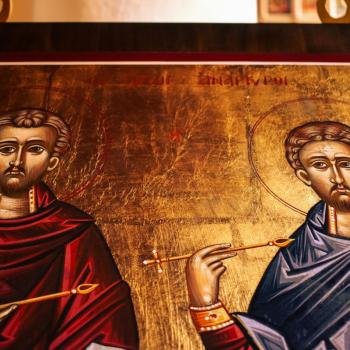Part II: “It’s Jesus, Christian!”– Liberal Struggles
Hebrews 1:1-4

Liberals often struggle with “Jesus.” Marcus Borg thought we needed to hit the reset button when it comes to Jesus in his Meeting Jesus Again for the First Time. Susan L. Bond wrote Trouble with Jesus: Women, Christology, and Preaching. Bart Ehrman bills himself “the happy agnostic” and has written extensively about Jesus. A revisionist approach to the Gnostics has predictably gained ground among Christian scholars. Perhaps no one has written more helpfully on Gnosticism than Elaine Pagels.
A frustrated liberal announced to me after church one Sunday, “Preacher, I’m leaving First Baptist. You talk about Jesus too much. I’m going to the Unitarian Church.” Jesus can even drive liberals crazy.
I am not surprised when liberals talk about “Christ” but not about “Jesus.” I am not surprised when liberals are questioning or jettisoning all theories of the atonement – the “bloody” faith is a tun-off for many. I am not shocked when liberals want to reduce Jesus to being only about love.
Liberals Struggle to Define and Name Jesus
The irony of the liberal attack on fundamentalism is that liberals share some of fundamentalism’s basic assumptions. Many liberals insist that biblical texts have meanings not dependent on the church. The search for the “original meaning” became as much a fetish for liberals as for fundamentalists. This was packaged with the pursuit of the “real,” “historical,” Jesus. Liberals are still haunted by the assumption that the educated critic is but a person of common sense.
Liberals seem committed to the idea that a rational individual can believe in God, be a good Christian, and not be initiated into a Church that requires the submission of the self. This buries Jesus under the influence of Constantinian Christianity dressed in the robes of Enlightenment rationality. And resurrecting him will be a large problem for liberals.
Cognitive scientist George Lakoff remarks that “most of us have inherited a theory of mind dating back at least to the Enlightenment, namely, that reason is conscious, literal, logical, unemotional, disembodied, universal, and functions to serve our interests. This theory of human reason has been shown to be false in every particular, but it persists. In many aspects of life this may not matter.” Antonio Damasio showed in Descartes’ Error that this Enlightenment view is utterly mistaken. Instead, reason requires emotion. And emotion, or as it was once called “enthusiasm,” scares the “Bejesus” out of most liberals.
The rational, highly educated liberal deals with Jesus and says, “That’s just what I thought,” and there’s the trouble. When Jesus says to his disciples, “The reason I speak to them in parables is that ‘seeing they do not perceive, and hearing they do not listen, nor do they understand,’” we should include all disciples of all time.
The Church Struggled with Jesus in the First Four Centuries
Jesus Heresies Burst Out all Over Asia Minor
In other words, “As it was in the beginning, is now and will be forever and ever.” Look at the early church heresies. Many of them have to do with getting Jesus wrong – Arians, Marcionites, Docetists, and Nestorians are a few of the many examples. There’s the belief that Jesus was born as a mere man and was later “adopted” as God’s son because of his holy life. There’s the belief that Jesus had a human body and lower soul (the seat of the emotions) but a divine mind. There’s the belief that Jesus’ physical body was an illusion, as was his crucifixion; that is, Jesus only seemed to have a physical body and to physically die, but in reality, he was incorporeal, a pure spirit, and hence could not physically die.
Gnostic Denial Of Jesus’ Jewishness Fueled Anti-Semitism and Racism
Early Gnostics decided to divorce Jesus from his Jewishness. The result was not only the horrors of antisemitism but the origin of racism. Kameron Carter makes a breath-taking claim in Race: A Theological Account, “For at the genealogical taproot of modern racial reasoning is the process by which Christ was abstracted from Jesus, and thus from his Jewish body, thereby severing Christianity from its Jewish roots. Jewish flesh in this moment underwent a religious conversion: it was converted into racial flesh, positioned within a hierarchy of racial-anthropological essences, and lodged within a now racialized chain of being. In making Christ non-Jewish in this moment, he was made a figure of the Occident. He became white, even if Jesus as a historical figure remained Jewish or racially a figure of the Orient. Theology’s participation in this process is what makes it modern. Indeed, theology assisted in bringing about modernity precisely in aiding and abetting this process.”
Howard Thurman, in Jesus and the Disinherited: “How different might have been the story of the last two thousand years on this planet grown old from suffering if the link between Jesus and Israel had never been severed. … [For] the Christian Church has tended to overlook its Judaic origins, … the fact that Jesus of Nazareth was a Jew of Palestine.”
Contemporary Scholarship Continues to Struggle with Jesus
Scholarship on the historical Jesus, the real Jesus, fills our theological libraries. Albert Schweitzer wrote The Mystery of the Kingdom of God in The Quest for the Historical Jesus. German New Testament theologian Rudolf Bultmann used existentialist philosophy to “demythologize” the teaching of Jesus. Ernst Käsemann, a former student of Bultmann’s, argued that it was necessary for Christian faith that continuity between the historical Jesus and the Christ of faith be established. A kind of consensus portrait of Jesus was published under the title Jesus of Nazareth in 1956 by Günther Bornkamm, another former student of Bultmann’s.
In 1985, the American scholar E. P. Sanders published his book Jesus and Judaism. Sanders concluded that Jesus should be interpreted as a prophet of the restoration of Israel. He expected God to intervene soon to establish a new and glorious age.
John Dominic Crossan, an Irish scholar, contrasts sharply with Sanders’s work. His book The Historical Jesus: The Life of a Mediterranean Jewish Peasant, published in 1991, is a revival of the nineteenth-century liberal view of Jesus.
Elisabeth Schüssler Fiorenza offered a feminist perspective in her article “Jesus and the Politics of Interpretation,” published in the Harvard Theological Review in 1997.
In 2006, emeritus Yale professor Wayne Meeks published Christ Is the Question, in which he argued that the identity of Jesus has been constructed by his followers and readers of the gospels from the time of his death until the present.
American scholar John P. Meier published three volumes on the historical Jesus under the umbrella title A Marginal Jew. This work is a model of secular, skeptical historiography that results in one of the more reliable portraits of the historical Jesus.
When the church hits the reset button, what happens? Jesus happens. It’s Jesus, Christian. God made God’s purpose clear in Jesus of Nazareth 2000 years ago. God spent centuries attempting to get the message through to humanity but now he has spoken to us “through a son” (Hebrews 1:2) The writers of the New Testament press against the boundaries of language to proclaim and exclaim Jesus. In him “all the fullness of God was embodied.” No one in history ever attracted this kind of language.
It’s Jesus, Christian! It’s Jesus! Work on the details! Ask, knock, and seek. He invites all our questions, embraces all our doubts, and we never will know it all for sure. But as long as we are on the trail of Jesus we are at least headed in the right direction.
We can take our lead from Hebrews 12, “looking to Jesus the pioneer and perfecter of our faith, who for the sake of the joy that was set before him endured the cross, disregarding its shame, and has taken his seat at the right hand of the throne of God. Consider him who endured such hostility against himself from sinners, so that you may not grow weary or lose heart.”













